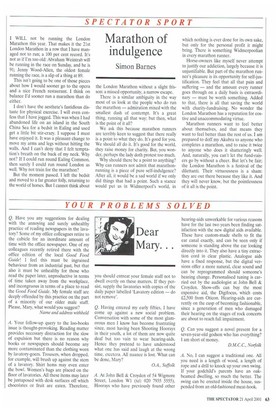Marathon of indulgence
Simon Barnes
I WILL not be running the London Marathon this year. That makes it the 21st London Marathon in a row that I have managed not to run; a 100 per cent record. It's not as if I'm too old: Abraham Weintrab will be running in the race on Sunday, and he is 91; Jenny Wood-Allen, the oldest female running the race, is a slip of a thing at 89.
This isn't going to be one of those pieces about how I would sooner go to the opera and a nice French restaurant. I think on balance I'd sooner run a marathon than do either.
I don't have the aesthete's fastidious distaste for physical exercise. I will even confess that I have jogged. This was when I had abandoned life on an island in the South China Sea for a bedsit in Ealing and used get a little bit stir-crazy. I suppose I must have enjoyed it. It was a pleasant change to move my arms and legs without hitting the walls. And I can't deny that I felt temptation's breath on the back of my neck. Why not? If I could run round Ealing Common, then surely I could run round London as well. Why not train for the marathon?
But the moment passed. I left the bedsit and moved to a far greater folly, returning to the world of horses. But I cannot think about the London Marathon without a slight frisson: a missed opportunity, a narrow escape.
There is a similar ambiguity in the way most of us look at the people who do run the marathon — admiration mixed with the smallest dash of contempt. It's a great thing, running all that way; but then, what is the point of it all?
We ask this because marathon runners are terribly keen to suggest that there really is a point to what they do. It's good for you. We should all do it. It's good for the world, they raise money for charity. But, you wonder, perhaps the lady doth protest too much.
Why should there be a point to anything? Why can runners not admit that marathonrunning is a piece of pure self-indulgence? After all, it would be a sad world if we only did things that had a point. Such a stance would put us in Widmerpool's world, in which nothing is ever done for its own sake, but only for the personal profit it might bring. There is something Widmerpoolian in every marathon runner.
Horse-owners like myself never attempt to justify our addiction, largely because it is unjustifiable. But part of the marathon runner's pleasure is its opportunity for self-justification. They feel that all that pain and suffering — and the amount every runner goes through on a daily basis is extraordinary — must be worth something, Added to that, there is all that saving the world with charity-fundraising. No wonder the London Marathon has a reputation for costive and unaccommodating virtue.
Marathon runners want to feel better about themselves, and that means they want to feel better than the rest of us. I am prepared to doff my Akubra to anyone who completes a marathon, and to raise it twice to anyone who does it shatteringly well, And, naturally, you can't let the fund-raisers go by without a cheer. But let's be fair; the London Marathon is a festival of the dilettanti. Their virtuousness is a sham: they are out there because they like it. And they will never know, but the pointlessness of it all is the point.


































































 Previous page
Previous page